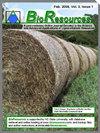Comprehensive treatment and disposal of logistics waste in China: Prospects of biomass resource conversion
IF 1.6
4区 农林科学
Q2 MATERIALS SCIENCE, PAPER & WOOD
引用次数: 0
Abstract
The exponential growth of China’s economy, coupled with the surge in online commerce, has led to a significant expansion of the logistics industry. In 2022, China’s express delivery industry generated approximately 9 million tons of waste paper and 1.8 million tons of plastic. This study analyzed the current composition and utilization of logistics waste in China, with suggestions for recycling. Logistics waste can be defined as the packaging waste generated in the logistics industry. Corrugated paper and plastic waste were chosen as the objects for utilization. Due to its high cellulose content, corrugated paper can be utilized along with other paper waste for biomass resourcing. Biodegradable plastics can also be converted into biomass resources through the action of specific microorganisms. These polymers can be enzymatically depolymerized by certain bacteria and fungi, yielding valuable organic products. In general, logistics wastes all have potential for biomass resource recovery. By adopting appropriate recovery and conversion technologies, these waste streams can be transformed into high-value bio-based products, such as biofuels, biochemicals, and biopolymers, thus contributing to the development of a circular and sustainable economy.中国物流废弃物的综合处理和处置:生物质资源转化的前景
中国经济的指数级增长,加上在线商务的激增,导致物流业大幅扩张。2022 年,中国快递业产生了约 900 万吨废纸和 180 万吨塑料。本研究分析了中国物流废弃物的构成和利用现状,并提出了回收利用的建议。物流废弃物可定义为物流业产生的包装废弃物。研究选择了瓦楞纸和塑料废弃物作为利用对象。瓦楞纸纤维素含量高,可与其他废纸一起作为生物质资源加以利用。生物降解塑料也可以通过特定微生物的作用转化为生物质资源。某些细菌和真菌可以对这些聚合物进行酶解聚,从而产生有价值的有机产品。总的来说,物流废物都具有生物质资源回收的潜力。通过采用适当的回收和转化技术,这些废物流可以转化为高价值的生物基产品,如生物燃料、生物化学品和生物聚合物,从而促进循环和可持续经济的发展。
本文章由计算机程序翻译,如有差异,请以英文原文为准。
求助全文
约1分钟内获得全文
求助全文
来源期刊

Bioresources
工程技术-材料科学:纸与木材
CiteScore
2.90
自引率
13.30%
发文量
397
审稿时长
2.3 months
期刊介绍:
The purpose of BioResources is to promote scientific discourse and to foster scientific developments related to sustainable manufacture involving lignocellulosic or woody biomass resources, including wood and agricultural residues. BioResources will focus on advances in science and technology. Emphasis will be placed on bioproducts, bioenergy, papermaking technology, wood products, new manufacturing materials, composite structures, and chemicals derived from lignocellulosic biomass.
 求助内容:
求助内容: 应助结果提醒方式:
应助结果提醒方式:


